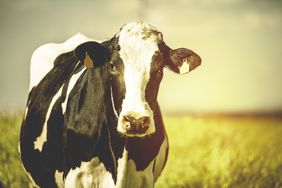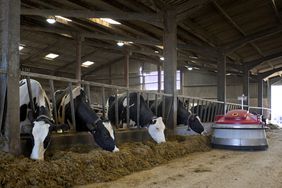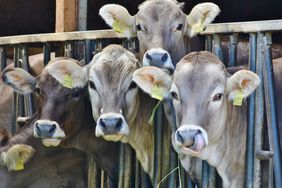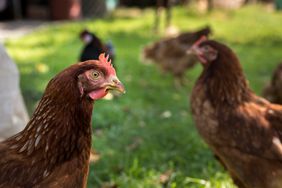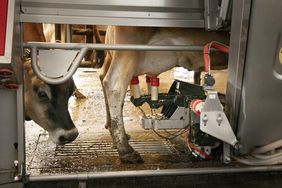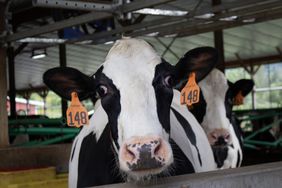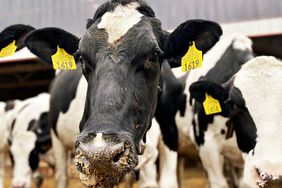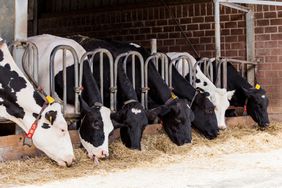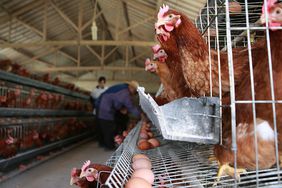:max_bytes(150000):strip_icc()/IMG_5155-765b7d2554114ca0a8ae5869a69549db.jpg)
When Mikayla Fasone graduated from Penn State, she stepped into a management position at her family's 100-year-old central New Jersey dairy farm.
She served as the farm's herdswoman and manager of on farm agri-tourism, including the annual summer camp, for three years. Then, with a dairy legacy that spans five generations, Fasone, 28, was ready to branch out on her own and create a dairy-farming lifestyle that spoke to her.
That is when she created Fresh Start Farm in Pipersville, Pennsylvania, a suburb of Philadelphia. Fasone's fresh start in making a dairy allowed her to balance her passions — cattle, selling raw milk, and people.
"I wanted to separate myself from my family's farm, but I also wanted to keep farming and working with cows, so this felt more aligned with me," Fasone says. "It's my farm, my fresh start."
Fasone didn't create Fresh Start on her own; she leaned into making a connection with the community by asking them to help her turn the 11-acre horse farm she bought with her husband, Joe, into a micro-dairy.
With Kickstarter, a crowd-sourced funding platform, her plans captured the attention of neighbors, who wanted the property to remain a small farm.
"I figured making a campaign was worth a shot. At most, it can't hurt," Fasone says.
Fasone decided to set a goal of $15,000 to help her purchase equipment for milking and fences, which she felt was an achievable number.
Exceeds Her Kickstarter Goal
By creating various sponsorship-like levels with rewards, she raised more than her initial pledge, receiving over $17,000 for her enterprise.
Fresh Start's Kickstarter donors could make various monetary pledges, such as the opportunity to name the first calf on the farm for a donation of $250.
Most people selected the $25 pledge, which meant they would receive social media recognition for their support on her Facebook and Instagram platforms.
Fasone shared her budget on the platform. For example, it cost $4,000 to cover the fencing, $4,200 for a milk house with a sloped concrete floor and drain, and $6,800 for a 30-gallon milk tank and milking equipment.
"I was blown away, and I am grateful for my community," she says.
:max_bytes(150000):strip_icc()/IMG_5156-3706e65056c247009361c1f1c0f5f9d5.jpg)
Constructing the Micro-Dairy Dream
When Fasone and her husband bought their charming, colonial country estate within Philadelphia's suburbs, it came with a four-box-stall and six-box-stall equestrian barn, a farm storage building, and a riding ring. After acquiring the property in 2020, Fasone quickly began converting the horse barn into a home for her cows and building a milk house.
She began by turning the tack room in the barn into a space to hold her milk tank, sinks for washing her equipment, waterproof walls, and a drain. Second, she removed barriers to make the six stalls roomier for her Holsteins.
"The stalls are not super cow-friendly, but it works," she says.
She also uses the rubber mulch riding ring as a sacrifice pasture for the cows to use when she's resting her grazing pasture.
Fasone says that besides the sacrifice lot, she also has a pasture of about 5.1 acres. With the funds from Kickstarter, she installed high-tensile fencing all around the pasture's perimeter. To succeed with regenerative-rotational grazing within her small paddock, she uses electric fencing, moves the cattle everyday, and lets the ground rest for an average of 30 days.
This allows the cows' movement to stimulate root recovery and sequester carbon, Fasone says.
For example, last spring, Fasone watched the weather and soil, which led her to have her cattle go through one rotation instead of two in preparation for the summer drought. She also sold a cow to destock and reduce the pasture's stress during the dry spell.
Today, Fresh Start is home to six cows, half Holstein and half Brown Swiss from Fasone's family dairy. One of the well-known bovine faces on Fasone's social media is Orchid, the first calf born at Fresh Start. With the six cattle, Fasone says she is at max capacity to remain sustainable for the amount of acreage she is farming.
She also buys small bales of mixed grass hay from her family farm and feeds grain to supplement the pasture. But for the most part, her management style allows the land's healthy soil base to fuel her cattle.
:max_bytes(150000):strip_icc()/IMG_5153-cd4647b9c7c046618bdb7361bef40058.jpg)
A Niche Market Opens Her Barn Doors
Raw milk was Fasone's key to setting up her dream dairy. In New Jersey, it is illegal to sell raw milk, but in Pennsylvania, it's legal with a permit from the Pennsylvania Department of Agriculture.
Raw milk is a niche market. Its customers differ from the average, as many are willing to make dairy products, such as cream.
"They are willing to put in the extra work," she says.
Fasone says she could be limiting herself by selling one product, but she doesn't mind. She likes being a small processor with on-farm sales.
"I am a farmer, and I get to stay on the farmer side without doing a market full-time," she says.
Her weekly goal is to sell out raw milk on the farm. She has a small on-farm store that she recently constructed, that has set hours open to the public. Fasone says she tries to keep the hours between morning and afternoon for opportunities to develop customer relationships, but it also gives her some personal flexibility.
As the summer camp and agritourism go-to person in her family's dairy, Fasone learned that some customers need more boundaries on a farm.
"I am not into the idea of being open 24/7. It's a home, not a public place," she says.
On average, Fasone sells raw milk to 25-30 households every week. Her customers buy three to eight plastic or glass half-gallon bottles for $6. However, at certain times of the year, she does have extra gallons of milk, as she estimates her small herd can produce about 10 gallons of milk per day. The extra gallon or two goes to a local soapmaker to make cow's milk soap for the farm to sell in addition to raw milk.
"People out there value what I am making and doing. They also can see the beauty of the farm. And selling my milk makes me feel helpful," says Fasone.
:max_bytes(150000):strip_icc()/IMG_21112028129-2000-cb2ffa5f4d094ce6a3d50ffb1d3dff39.jpg)
Fresh Start’s Milk-a-Cow Class
The Kickstarter campaign was Fasone's way to dip her toe into agritourism with Fresh Start. After gaining the support of 84 backers, most met Fasone and her cows for the first time on her farm tour. The tour is about 45 minutes, where she goes over her background in dairy and why she started Fresh Start, introducing the cows, and her regenerative farming practices.
Fasone has hosted a farm immersion experience that allows a person to join her on the daily tasks of feeding the cows, fixing fences, and milking. But that adventure doesn't get the fanfare her milk-a-cow class receives — the course allows a customer to milk a cow by hand. However, only a few have milked the cows thoroughly.
"It's more entertainment-focused than educational for some, but it's an experience that many like," Fasone says.
Creating a dairy farm on her terms has been Fasone's pilgrimage of coming into her own as a dairy woman. She also likes to encourage other women who have an interest in farming to take opportunities and the chance to do what she did — farm on their way.
"It's been a long process of patience, trusting myself, and doing the work," she says. "It's not easy, but once you understand your management plan and create boundaries, it's worth it."
